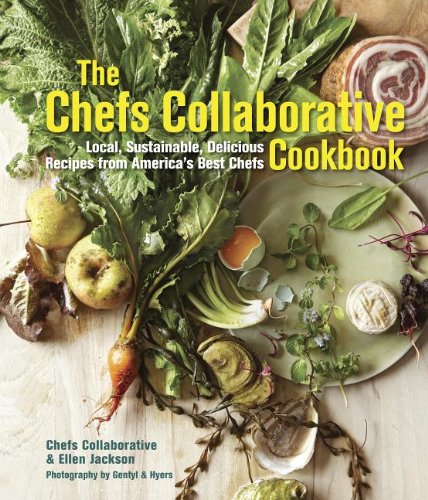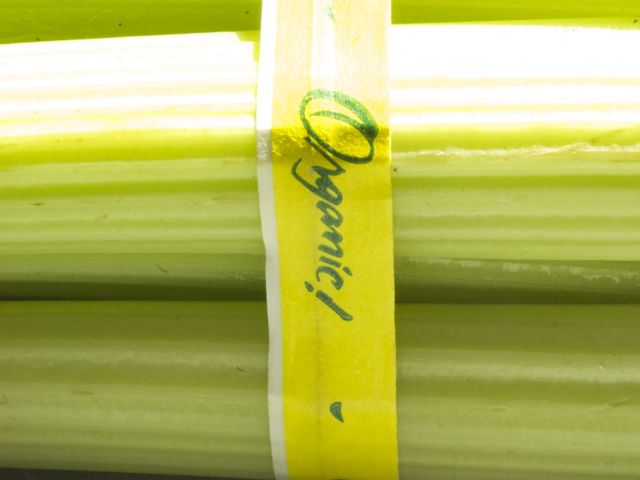
reference-image, l
(article, Chefs Collaborative & Ellen Jackson)
[%pageBreakSettings nobreak=true][%adInjectionSettings noInject=true] p(blue).Culinate editor's note: The newly published Chefs Collaborative Cookbook is full of well-tested recipes contributed from chefs around the country — like the Oregon Filbert and Honey Tart, a luxurious treat by Portland, Oregon, baker Piper Davis. However, the book also contains a lot of useful ancillary material in its "Breaking It Down" sections, such as the following one on produce labels. h3. From the section titled "Reading the Labels" As with meat, eggs, and dairy products, there are certain terms and claims used to promote and label vegetables, fruits, and other edible plants. Some are unique to produce items; others appear in multiple food categories. The following list, which draws in part from a comprehensive list compiled by AWA (Animal Welfare Approved), includes terms and claims that are defined and controlled by the government — and many more that are not. Since common unregulated terms like “natural” and “locally grown” are widely used to attract buyers, understanding their value is key to making informed choices. [[block(sidebar). h1. About the book and authors Chefs Collaborative is a nonprofit network of chefs that fosters a sustainable food system through advocacy, education, and collaboration with the broader food community. Former pastry chef and current Portland Farmers Market board member Ellen Jackson has co-authored numerous cookbooks, including The Grand Central Baking Book. The Chefs Collaborative Cookbook is the first cookbook from Chefs Collaborative. With 115 recipes from 115 of America's best-known chefs, the book is divided into four sections (vegetables, fruits, and other edible plants; meat and poultry; fish and seafood; and dairy and eggs) and features information about the principles of sustainability provided by farmers, artisanal producers, breeders, environmentalists, and activists. Reprinted with permission from The Taunton Press. Copyright © 2013. ]] Beyond Organic/Better Than Organic/More Than Organic No legal or regulated definition All of these terms imply that the products described meet and exceed organic standards, though no verification of farming methods is defined or audited to ensure that this is the case. Biodynamic No legal or regulated definition “Biodynamic” agriculture goes beyond organic, envisioning the farm as a self-contained and self-sustaining organism. In addition to using organic practices such as crop rotation and composting, biodynamic farmers rely on special plant, animal, and mineral preparations and the rhythmic influences of the sun and moon. Certified Farmer’s Market No legal or regulated definition A handful of states require their farmer’s markets to be certified as a means of attempting to ensure that the farmers themselves produce the products being sold. Most markets establish their own rules for verifying product integrity at the local level. Certified Naturally Grown (CNG) No legal or regulated definition Certified Naturally Grown is a nonprofit organization offering certification programs tailored for small-scale, direct-to-market farmers and beekeepers using natural methods. CNG products are certified as having been produced in approximate accordance with national organic standards. The term is modeled on Participatory Guarantee Systems (PGS) programs that use a peer-review inspection process built on local networks. Conventional No legal or regulated definition “Conventional” refers to standard agricultural practices that are widespread in the industry. It may or may not include the use of pesticides, synthetic fertilizers, monocropping, and genetically modified organisms (GMOs). Fair Trade Defined by the Fairtrade Foundation The Fairtrade Foundation focuses on better prices, decent working conditions, local sustainability, and fair terms of trade for farmers and workers in the developing world. Most often used for coffee, the Fair Trade label indicates that the company has paid a sustainable price (that never falls below the market price) in an effort to address conventional trade’s discrimination against the poorest, weakest producers. Food Alliance Certified Defined by Food Alliance This nonprofit organization certifies farms as well as food processors and distributors for sustainable agricultural and facility management practices. The purchase of Food Alliance certified products by consumers and commercial food buyers supports safe and fair working conditions and good environmental stewardship. [%image bookcover float=right width=300] Genetically Modified Organisms (GMOs)/Genetically Engineered No legal or regulated definition GMOs are plants and animals whose genetic makeup has been altered to exhibit traits that they would not normally have, like longer shelf life, an altered nutritional profile, a different color, or resistance to drought, certain chemicals, or pests. There are significant concerns about the potential environmental impact of genetically modified crops. Genetic modification is currently allowed in conventional farming, and foods that contain GMOs do not have to be labeled. Heirloom No legal or regulated definition “Heirloom” is used to describe unique plant varieties that are genetically distinct from the commercial varieties introduced by industrial agriculture. Heirloom varieties (sometimes also called antique, heritage, or traditional) are open-pollinated varieties with a long history (usually at least 50 years) of being cultivated, saved, and passed down by farmers within a family or group. They have evolved over time by natural or human selection. The term does not refer to specific farming practices or pesticide use. Locally Grown No legal or regulated definition This term is used for food and other agricultural products that are produced, processed, and sold within a certain region. Eligibility might be subject to distance, state borders, regional boundaries, or some other measure, and can be defined and regulated by individuals based on their specific mission and circumstances. Non-GMO Project Defined by the Non-GMO Project Retailers and manufacturers who have chosen to take a proactive stance around the issue of genetically modified organisms (GMOs) can participate in the Non-GMO Project, the first and only organization to offer independent verification for products made in the U.S. and Canada according to best practices for GMO avoidance. The nonprofit collaboration is committed to preserving and building sources of non-GMO products and consumer education and providing verified non-GMO choices by labeling products with a Non-GMO Project seal. No-Till/Minimum-Till/Conservation Tillage No legal or regulated definition “No-till” describes a method at the core of agricultural sustainability practices. By directly seeding the next season’s crops using little or no plowing, no-till operations reduce soil erosion and build valuable, nutrient-rich topsoil. In the absence of a technique for cultivating the soil, herbicides may be used to control weeds. No-Spray/Pesticide-Free No legal or regulated definition Use of this term on a label or in marketing is not a guarantee that a farm or product is organic, but implies that no pesticides, herbicides, or fungicides have been applied. [%image feature-image float=right width=400 caption="Organic/Certified Organic is one of the few labels that's defined by the federal government."]Organic/Certified Organic Defined by the USDA Products sold as “organic” must meet the USDA’s National Organic Program production and handling standards. Generally speaking, organic production limits the use of chemicals, pesticides, and other inputs. It does not define production practices. Pesticide-Free No legal or regulated definition Used on its own, “pesticide-free” implies that no pesticide residue can be found on the crop. It does not address whether or not pesticides, herbicides, or fungicides were applied at other points in production. Sustainable Agriculture No legal or regulated definition Sustainable farming is socially just, economically viable, environmentally sound, and ensures animal welfare. The 1990 Farm Bill included this definition: "The term sustainable agriculture means an integrated system of plant and animal production practices having a site-specific application that will, over the long term: satisfy human food and fiber needs; enhance environmental quality and the natural resource base upon which the agricultural economy depends; make the most efficient use of nonrenewable resources and on-farm resources and integrate, where appropriate, natural biological cycles and controls; sustain the economic viability of farm operations; and enhance the quality of life for farmers and society as a whole." Transitional No legal or regulated definition “Transitional” is an unofficial term implying that a farm is in the process of making the switch from conventional toward organic certification. (Products from that farm may also be labeled “transitional.”) Organic methods must be practiced on the given area of land for three years before products harvested from it can be labeled as certified organic. Vine-Ripened/Tree-Ripened No legal or regulated definition The term is used for fruit that has been allowed to ripen on the vine or tree. Many fruits are picked while still firm and unripe in order to ship long distances without damage, then treated with ethylene gas to soften when they arrive at their destination. “Vine-ripened” does not mean that the item is organic, non-GMO, pesticide free, or sustainably or family farmed.

reference-image, l

bookcover, l

feature-image, l

featurette-image, l

newsletter-image, l